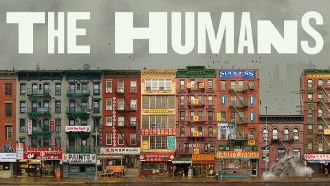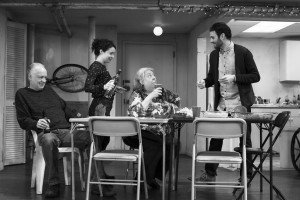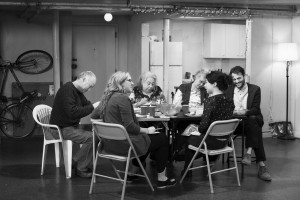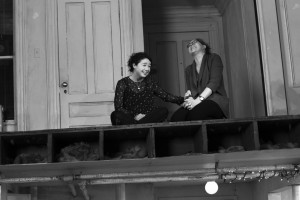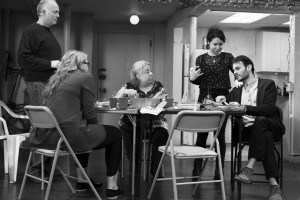ALL TOO HUMAN
Stephen Karam’s remarkable new play The Humans begins with Erik Blake (the excellent Reed Birney) standing on the upper level of a shabby, half-dark basement/ground-floor tenement duplex, holding two bags of groceries, his expression suggesting a man weighed down by existential anxiety. The stillness is broken by the sound of something massive crashing in the apartment above, which sends Erik cringing down to the floor as if the whole building were collapsing down upon him. In all likelihood the noise was of a heavy piece of furniture being moved, perhaps falling. Yet the character of the sound (powerful design by Fitz Patton) suggests something frightening, something bigger and heavier than any manageable object, something blunt and stupid and wholly indifferent to all that is human.
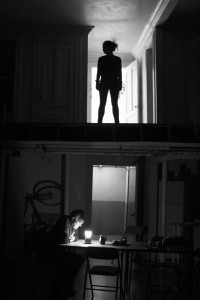 Then the dreadful spell is lifted as the apartment suddenly comes alive with the rest of the Blakes, who show up for Thanksgiving dinner. It’s a familiar scene’”the banter, the preparations, the personal news, the plans and hopes and disappointments of a loving family. We’ve all been in these situations and the interactions seem almost banal. And yet they are quietly riveting and subtly muscular; we are fascinated and cannot look away.
Then the dreadful spell is lifted as the apartment suddenly comes alive with the rest of the Blakes, who show up for Thanksgiving dinner. It’s a familiar scene’”the banter, the preparations, the personal news, the plans and hopes and disappointments of a loving family. We’ve all been in these situations and the interactions seem almost banal. And yet they are quietly riveting and subtly muscular; we are fascinated and cannot look away.
The hosts are Erik’s younger daughter Brigid (Sarah Steele), a recent recipient of a music degree, and her 38-year-old boyfriend Richard (Arian Moayed), who’s getting his PhD in social work. They just moved into the place, able to afford the duplex only because it’s got vermin and was flooded during Hurricane Sandy (dynamic split-level set by David Zinn). We meet Brigid’s older sister Aimee, a New York attorney who will soon lose her job as a result of a chronic health condition, and who is going through a painful break-up. Their mother Deirdre (Jayne Houdyshell), who drove in from Scranton with Erik and his mom, hasn’t aged quite as well as her husband, and her decades of experience managing the same office aren’t evidenced by her remuneration. Then there’s “Momo” (Lauren Klein), Erik’s demented mother, who requires a wheelchair, constant care, and sedatives to control her incomprehensible outbursts.
These are ordinary people with ordinary problems. What is transcendent about The Humans is the care and precision with which characters and situations are rendered on paper, and the grace with which director Joe Mantello stages the show. Every casual-seeming detail is a meaningful part of a living whole, of a world so natural, so flawless and complete’”thanks in no small part to the outstanding cast’”that it looks spontaneous, effortless, as though it just materialized before us of its own accord. (On several occasions I caught myself experiencing the urge to applaud, not in praise of an actor but in solidarity with a character.)
Misters Karam and Mantello don’t push us, they allow us to be in discovery until we become part of this Irish-American family and emotionally share in their burdens. The causes of the Blakes’ difficulties are so commonplace as to seem barely worth mentioning’”disease, lack of skills, lack of money, other people’s indifference, bad luck. But as banal as these problems might seem, they are real and unsolvable. And in this way they take on mystical qualities and mythical proportions; presented with specificity through the narrow lens of the characters, their problems take on global significance. We find ourselves experiencing them from the inside, and gradually the world that looked vast and full of possibilities becomes small, like a pond drying up, with reality’s various representatives’”supervisors, microbes, grocery prices’”taking bites out of you like piranha from a floundering fish, until you can’t fight or escape. Then all you can do is bear it, and love.
photos by Brigitte Lacombe
The Humans
Roundabout Theatre Company
Helen Hayes Theatre, 240 West 44th Street
for tickets, call 212.239.6200 or visit Telecharge
for more info, visit The Humans
